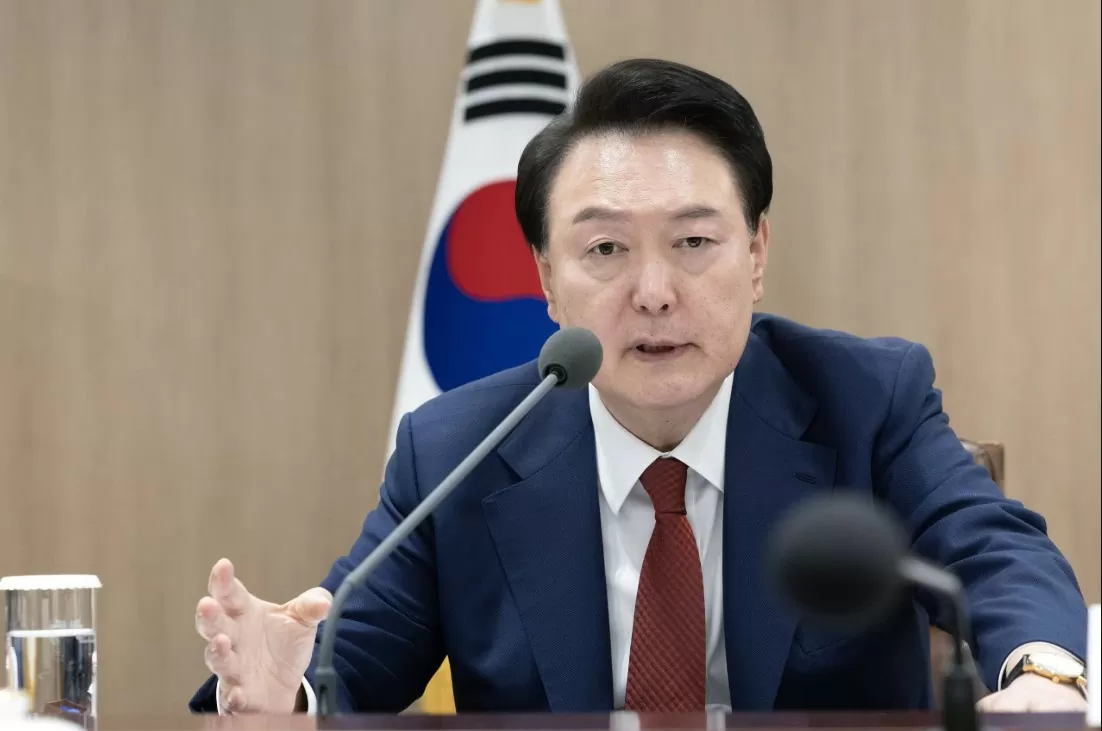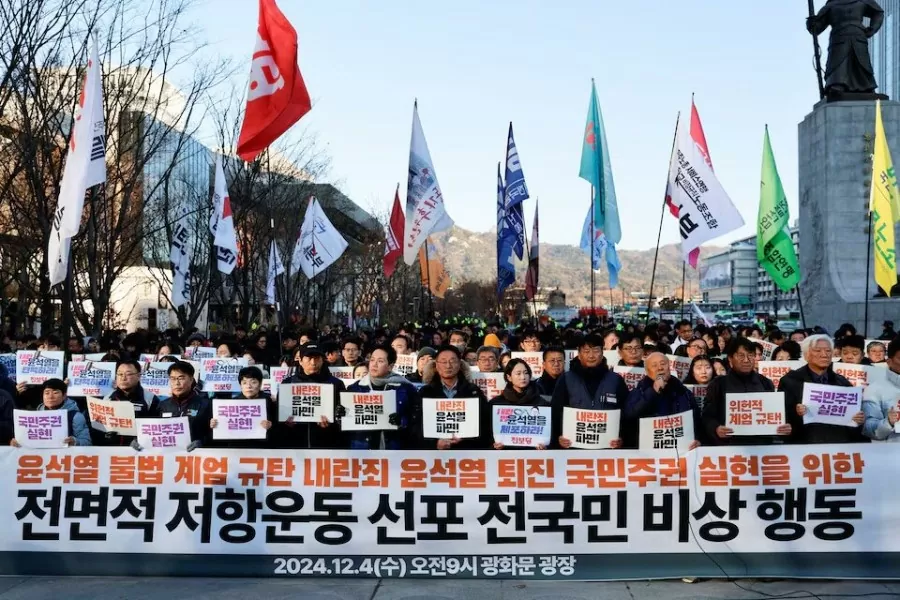At midnight on December 3rd, a "seismic shock" rocked South Korea after President Yoon Suk Yeol unexpectedly declared a state of emergency. Although the decree was revoked just six hours later, these dramatic events once again demonstrated the unpredictable nature of South Korean politics.
 |
| President Yoon Suk Yeol unexpectedly declared martial law on the night of December 3rd. (Source: Yonhap) |
The action did more harm than good.
Explaining the sudden issuance of this decree, President Yoon Suk Yeol stated that the Democratic Party (DP), the main opposition party in the National Assembly, was engaging in actions that could benefit North Korea and were acting against the state. To prevent the situation from spiraling out of control, the presidential decree banned protests and activities of political parties, and ordered all media outlets to be placed under military control.
Immediately after the decree was issued, the military and police were deployed around the National Assembly building, on the streets of Seoul, and at key locations. A suffocating atmosphere enveloped the capital. Many South Koreans foresaw a bleak period ahead...
However, in the early morning of December 4th, President Yoon himself had to announce the lifting of martial law at the request of the National Assembly, where the DP controlled a majority of seats. Among those who opposed martial law and sided with the opposition were also lawmakers from President Yoon Suk Yeol's People Power Party (PPP).
Speaking on the evening of December 3rd when declaring martial law, Yoon Suk Yeol denounced the opposition in the National Assembly, accusing them of establishing a "legislative dictatorship" by blocking and cutting the government 's budget proposals. According to the Blue House, these actions have paralyzed the South Korean judiciary, weakened essential state functions, turned the country into a haven for drug traffickers, while citizens face a livelihood crisis.
The conflict is simmering.
Yoon Suk Yeol's statement reflects the tension between his administration and the DP. In fact, the rivalry between the DP and the PPP has been simmering for a long time, especially since the 2022 election. In that election, Yoon Suk Yeol defeated his DP opponent Lee Jae Myung by approximately 240,000 votes. This victory was a bitter blow for the DP, transforming them from the ruling party (DP President Moon Jae In held power from May 2017 to May 2022) into the opposition party.
However, despite being the opposition party, the DP holds a majority of seats in the National Assembly. This seat gap widened further when the DP won a landslide victory in the April 2024 election, securing 161 out of 254 seats, while the PPP only managed 90. Because of this, President Yoon Suk Yeol's administration has faced numerous obstacles in the National Assembly regarding budget, governance, legislation, tax reform, and other issues, preventing him from fulfilling his campaign promises.
More importantly, the DP also advocates a more conciliatory approach towards Pyongyang, while South Korea's 13th president takes a tougher stance toward its northern neighbor and moves closer to Washington.
However, the DP's control of Parliament and its constant attempts to obstruct the ruling party are only the tip of the iceberg. More fundamentally, it's a political competition between parties to consolidate their positions and pave the way for their party members to remain in the Blue House.
The current South Korean constitution stipulates that each president-elect can only serve one term, not exceeding five years. Therefore, to maintain the ruling party's power, presidents always seek to consolidate their prestige and pave the way for other party candidates while looking for weaknesses to criticize their opponents in order to gain an advantage, especially as elections approach.
 |
| South Korean citizens protest in Seoul, the capital city, on December 4th. (Source: Yonhap) |
Undesirable scenario
This fierce competition leads to constant tit-for-tat actions from both sides, as Professor Cho Youngho of Sogang University (South Korea) likened the Korean political arena to "a gladiatorial arena."
Observers believe that President Yoon Suk Yeol's declaration of martial law was the final straw after a period of tension between his administration and the opposition-controlled National Assembly.
Although martial law was quickly lifted, this "unavoidable" action by President Yoon provided a good opportunity for opposition lawmakers, and even a segment of PPP members, to criticize Yoon Suk Yeol. They seized this opportunity to demonstrate to voters that they are always listening to the people's opinions in order to retain their seats for the next election.
According to Yonhap, the DP not only demanded the lifting of the curfew but also called for the immediate resignation of the current president. They argued that if Yoon Suk Yeol refused, his "unconstitutional" actions on the night of December 3rd would constitute treason and incitement to rebellion, which would be grounds for initiating impeachment proceedings. And it wasn't just the opposition; on the morning of December 4th, senior advisors to President Yoon also submitted their resignations en masse to express their disapproval.
The South Korean National Assembly currently has 300 seats, with the DP controlling over 170, a majority sufficient to initiate impeachment proceedings. Meanwhile, 18 lawmakers from the ruling PPP, including the party's leader, sided with the opposition by passing a resolution demanding that President Yoon lift martial law.
This suggests that President Yoon Suk Yeol may face a "ten-sided ambush," confronted with two scenarios, neither of which he desired when declaring martial law: resignation or impeachment.
Both scenarios that the opposition is pressuring President Yoon Suk Yeon towards are aimed at forcing him to step down from the Blue House. Let's see how Yoon and his allies will solve this difficult problem!
Source: https://baoquocte.vn/tong-thong-han-quoc-ban-bo-tinh-trang-khan-cap-giot-nuoc-tran-ly-o-seoul-295731.html



![[Photo] National Assembly Chairman Tran Thanh Man visits and works with the National Assembly Committees and the State Audit Office.](https://vphoto.vietnam.vn/thumb/1200x675/vietnam/resource/IMAGE/2026/02/23/1771848141941_ndo_br_bnd-6798-jpg.webp)




































































































Comment (0)